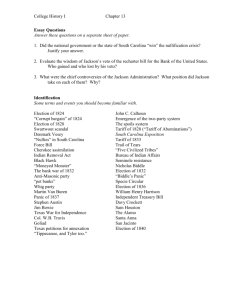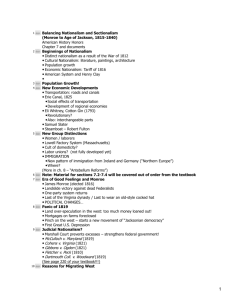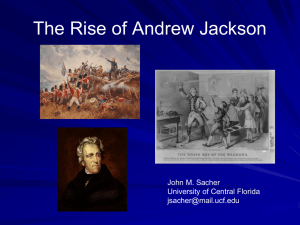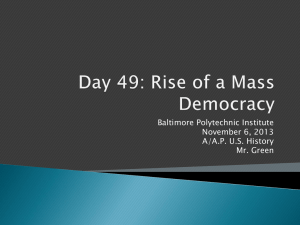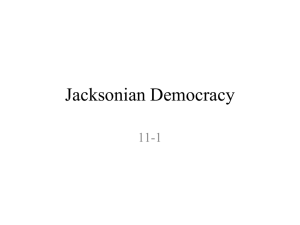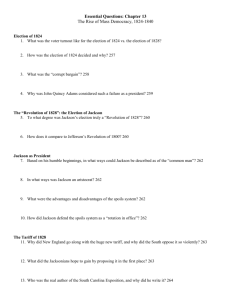Jacksonian Democracy
advertisement
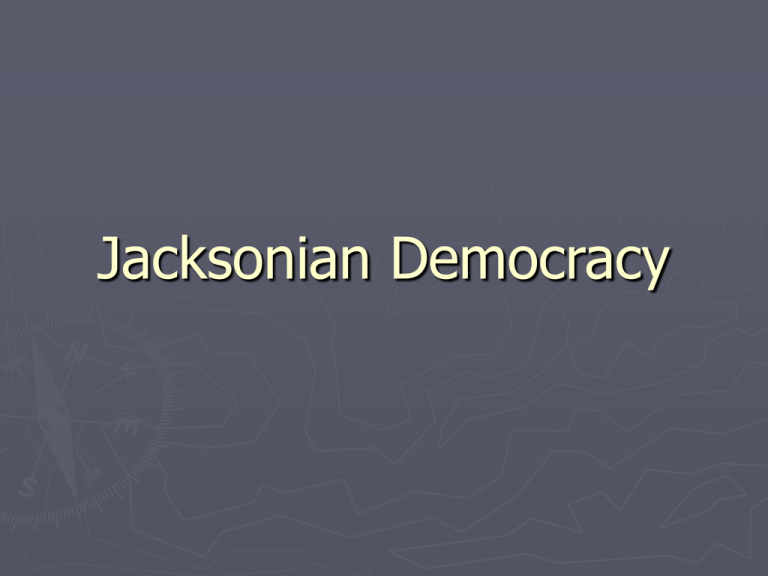
Jacksonian Democracy Personality ► “Old Hickory” ► From Tennessee frontier ► Doer – not thinker Invasion of Fla: 1817 ► Decisive ► Temper ► Hero – romantic figure Election of 1824 Henry Clay [KY] John Quincy Adams [MA] William H. Crawford [GA] Results of the 1824 Election Election of 1828 ► ► JQA v. Jackson Corrupt Bargain ► Jackson appears virtuous Mudslinging Jackson home wrecker ► murderer ► Adams ► ► pimp frivolous spender 1828 Election Results Jacksonian Democracy ► ► ► ► ► Worth of the common man Equal opportunity to succeed Made it cool to be common Gov’t should not create special advantages States rights Strict interpretation of the Constitution Union was a permanent entity Jacksonian v. Jeffersonian Democracy ► After Jefferson: All Dem-Rep Presidents ► Birth of Democratic Party ► Differences Education required for effective decision making ► Jefferson: Yes Jackson: No Jefferson: OK to be a common man Jackson: Glorified the common man (mediocrity was a virtue) ► Capable of uncommon things ► Rotation in Office King Andrew I ► Weak federal gov’t but a strong presidency Reshapes it ► Representative of the will of the American people Ignored Supreme Court and Congress Veto use Rules on constitutionality Spoils System ► Reward political supporters Remove JQA’s guys ► “To the victor goes the spoils” ► Seen as democratic, but also allowed him to control Presidency ► Kitchen Cabinet Retrenchment and Reform ► Retrenchment (reduce expenses) Eliminate federal deficit Threat to liberty Done by 2nd term ► Reform Remove corruption from gov’t Kickbacks with government contracts They were a threat to democracy Crises ► Peggy Eaton Affair ► Nullification Crisis ► The National Bank War ► Indian Removal Peggy Eaton Affair ► John Eaton – Sec of War Married Peggy Timberlake – commoner ► Eatons excluded by Washington insiders John Calhoun (VP) – his wife was worst ► Jackson will remove Calhoun in 1831 Nullification Crisis ► South feels isolated Tariffs (1816, 1824, 1828) American System Rising opposition to slavery ► Tariff of 1832 ► Ordinance of Nullification ► Clay’s Compromise – Tariff of 1833 ► Force Bill ► SC concedes Second National Bank ► First Bank expired 1811 ► Second Bank chartered 1816 80% private investors – some foreign ► Bank Pres - Nicholas Biddle Young, cultured, arrogant He and Jackson did not get along Bank War ► Election of 1832: Jackson v. Clay ► Bank recharter scheme ► Jackson Veto Bank of US is a monopoly Bank is unconstitutional Instrument of the wealthy Foreign owned ► The veto stands Election of 1832 Destroy the National Bank Pet Banks ► pro-Jackson Two Secs. of Treasury refused Jackson appoints Roger B. Taney Senate censure - 1834 ► ► ► Only time in history Violation of the Constitution and abuse of power Conflict of interest Downfall of Mother Bank Impact of Jackson’s Economic Policy ► National Bank no ► Land Speculation longer regulates currency Borrow from wildcat banks ► Jackson discouraged by speculation ► Issues Specie Circular - 1836 Land sales transactions must be completed in gold or silver ► Stopped speculation Land prices fall – people lose everything (Foreclosures) Banks go under ► Leads to Panic of 1837 Destruction of the National Bank ► Many historians argue.. Jackson destroyed a vital financial institution ► ► Could have helped alleviate pressures from Panic of 1837 It seemed like he reduced this issue to a personal vendetta rather than trying to understand the importance of this institution to society. He did not keep the best interests of the country in mind. Indian Removal Act ► Cotton Land – South East Americans wanted it ► Treaties gave land to Native Americans ► Americans began encroaching ► What are his alternatives? Indian Removal Act ► Georgia, Alabama, and Mississippi legislatures disbanded the treaties unconstitutional act - treaties were federal policies ► Indian Removal Act Some moved without issue Seminoles fought – Second Seminole War Cherokees attempted to adopt European culture Challenged the legislation through the court system ► Cherokee Nation v. Georgia - 1831 ► Worchester v. Georgia - 1832 “John Marshall has made his decision, now let him enforce it” Cherokee Nation – 1820s Indian Removal 1831-1838 Costly Mistakes ► Lack of organization no monitoring of this operation Very few regulations established ► Inadequate funds ► Widespread disease, injuries and death Trail of Tears About 25% don’t make it ► Black eye for America Trail of Tears

